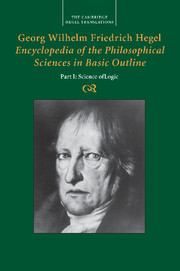 Georg Wilhelm Friedrich Hegel: Encyclopedia of the Philosophical Sciences in Basic Outline
Georg Wilhelm Friedrich Hegel: Encyclopedia of the Philosophical Sciences in Basic Outline Book contents
- Frontmatter
- Contents
- Acknowledgments
- Introduction: Hegel’s Encyclopedia Logic
- Translators’ Note
- Encyclopedia of the Philosophical Sciences in Basic Outline, Part I: Science of Logic
- Part I Science of Logic §§ 19–244
- Bibliography
- Glossary of Translated Terms, German to English
- Glossary of Translated Terms, English to German
- Index
Second Subdivision of the Logic: The Doctrine of Essence §§ 112–159
Published online by Cambridge University Press: 30 September 2021
- Frontmatter
- Contents
- Acknowledgments
- Introduction: Hegel’s Encyclopedia Logic
- Translators’ Note
- Encyclopedia of the Philosophical Sciences in Basic Outline, Part I: Science of Logic
- Part I Science of Logic §§ 19–244
- Bibliography
- Glossary of Translated Terms, German to English
- Glossary of Translated Terms, English to German
- Index
Summary
§112
The essence is the concept insofar as it is simply posited; in the essence, the determinations are only relative, they are not yet fully reflected in themselves. For this reason, the concept is not yet for itself. As being that mediates itself with itself in virtue of its negativity, essence is relation to itself only insofar as it is relation to an other that is, however, not immediately a being, but something posited and mediated. – Being has not disappeared; instead, in the first place, the essence, as a simple relation to itself, is being; in the second place, moreover, in keeping with being's one-sided determination as something immediate, being has been demoted to something merely negative, to a shine [Scheine]. – The essence is accordingly being as shining in itself [Scheinen in sich selbst].
The absolute is essence. – This definition is the same as the definition that it is being, insofar as being is also the simple relation to itself; but at the same time it is higher since the essence is being that has gone into itself, that is to say, its simple relation to itself is this relation, posited as the negation of the negative, as mediation of itself in itself with itself. – However, when the absolute is determined as essence, negativity is frequently taken only in the sense of an abstraction from all determinate predicates. This negative act, the abstracting, then falls outside of the essence and the essence itself is thus only a result without these, its premises, the caput mortuum of abstraction. But since this negativity is not external to being, but instead is its own dialectic, then its truth, the essence, is the being that has gone into itself or is in itself; that reflection, its process of shining in itself, constitutes its difference from immediate being and is the distinctive determination of the essence itself.
Addition. Any talk of essence entails distinguishing it from being as immediate and considering the latter as a mere semblance in regard to the essence. This semblance, however, is not by any means denied; it is not nothing, but is instead being as sublated.
- Type
- Chapter
- Information
- Georg Wilhelm Friedrich Hegel: Encyclopedia of the Philosophical Sciences in Basic OutlinePart I: Science of Logic, pp. 173 - 232Publisher: Cambridge University PressPrint publication year: 2010
